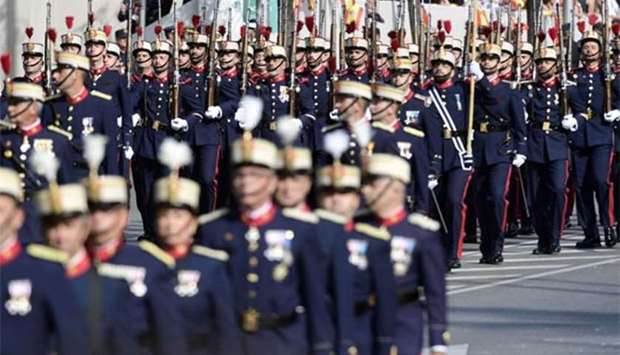* National day falls amid worst political crisis in decades
* Mainly peaceful demonstration celebrate united Spain* Catalan turnout much higher this year
Spaniards lined the streets of Madrid and Barcelona on Thursday and national flags hung from balconies across the capital as unionists used a public holiday to demonstrate unity in the face of moves by Catalonia to declare independence.
The wealthy region's intention to break away has plunged Spain into its worst political crisis since an attempted military coup in 1981, with Madrid threatening to sack the Catalan government if it goes ahead.
Madrid's customary military parade marking the anniversary of explorer Christopher Columbus's arrival in the Americas on behalf of the Spanish crown took place in a city already festooned with flags hung by Spaniards in a display of unity.
"We came with the whole family to celebrate the day of Spain and ... living in a free country ... and to support the security forces of the state and the government after this complicated situation we have been living in these past days," said Madrid resident Carlos Alvaro.
Tension remains high between the central government and Catalonia after the region's leader signed a symbolic declaration of independence on Tuesday, citing the results of an October 1 referendum which had been declared illegal by Madrid.
Catalan government chief Carles Puigdemont has stopped short of moving a motion of independence in the regional parliament, disappointing many of his own supporters.
Prime Minister Mariano Rajoy has given Puigdemont eight days to drop his push for independence or face the suspension of its political autonomy.
If Puigdemont does not respond in time or confirms a will to secede, Rajoy can impose rule from Madrid, an option enshrined in article 155 of the 1978 constitution.
"Ask for dialogue and they answer you by putting the 155 on the table. Understood," Puigdemont tweeted late on Wednesday.
Uncertainty remains over what article 155, which has never been invoked before, would mean in practice.
"I can't tell you exactly what the measures are," Foreign Minister Alfonso Dastis told France's CNews TV channel.
"Article 155 ... can be fine-tuned, and that's certainly what the government will do," Dastis said.
Political analysts expect Rajoy's next step would be to call a snap regional election to plot a path out of the crisis.
'I am European'
King Felipe presided over the Madrid parade, which included almost 4,000 military and police officials. Last week, in a rare intervention, he accused Catalan secessionist leaders of shattering democratic principles and dividing their society.
People also gathered in central Barcelona, the Catalan capital, where a police crackdown during the banned October 1 vote exacerbated the crisis.
El Mundo newspaper reported 65,000 turned out on Thursday, at least 10 times more than on last year's national holiday, but only a fifth of the crowd that turned out to oppose independence last weekend, calling themselves the "silent majority".
Puigdemont said 90% of voters in the referendum backed secession, but turnout was only 43%. Polls conducted beforehand had suggested around 40% support for independence.
Thursday's demonstrations were mostly peaceful, but city police intervened to stop a scuffle in central Barcelona when demonstrators threw chairs and cafe tables. Around 100 far-right activists set fire to the striped and starred Catalan flag.
Financial markets watching the situation in the euro zone's fourth-largest economy breathed a sigh of relief and the euro climbed when Puigdemont signed the symbolic declaration rather than formally announcing a split on October 10.
Genoveva Cabrera, a 63-year-old demonstrating for unity in Barcelona on Thursday said: "I am with Spain, with the civil guard (police), I am a democrat, I am Catalan, I am Spanish, I am European."

